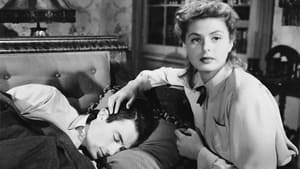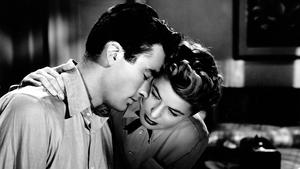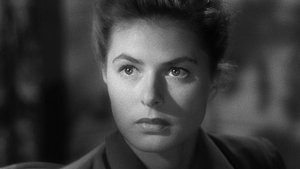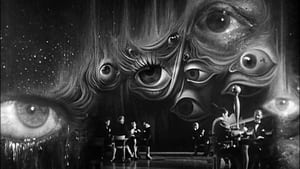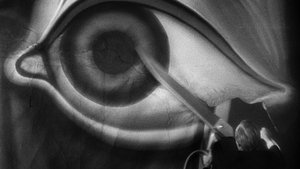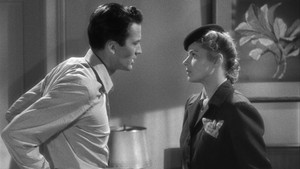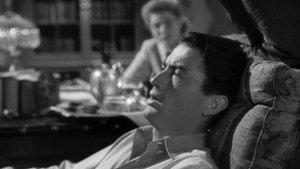Contact: info@alwanfilm.com
Video Sources 0 Views
- Watch trailer
- Spellbound

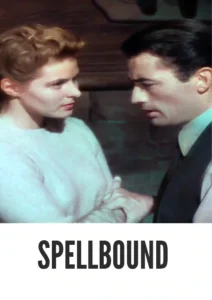
Synopsis
Table of Contents
ToggleReview: Spellbound 1945 Colorized – A Surreal and Psychological Masterpiece

Introduction
Spellbound, directed by Alfred Hitchcock and released in 1945, stands as a landmark film in the psychological thriller genre. Renowned for its surreal visuals, intricate plot, and captivating performances, this classic masterpiece continues to intrigue audiences with its exploration of the human mind and the mysteries of the subconscious. In this review, we’ll delve into the enigmatic world of Spellbound and uncover its enduring allure.
Check The Full Colorized Movies List
Check Our Colorized Movies Trailer Channel
Understanding Spellbound 1945 Colorized: Director, Cast, and Genre
Directed by the master of suspense himself, Alfred Hitchcock, Spellbound features a stellar cast led by Ingrid Bergman and Gregory Peck. The film belongs to the psychological thriller genre, known for its exploration of the human psyche and its ability to keep audiences on the edge of their seats.
Exploring the World of Spellbound 1945 Colorized: Plot and Characters
Spellbound follows the story of Dr. Constance Petersen, a psychiatrist at Green Manors mental asylum, who becomes entangled in a web of mystery and intrigue when the new director, Dr. Anthony Edwardes, arrives under suspicious circumstances. As Constance delves deeper into Edwardes’ past, she uncovers dark secrets and confronts her own inner demons, leading to a thrilling climax that explores the depths of the human mind.
The Art of Film Colorization
While Spellbound was originally filmed in black and white, its early colorized version adds a new layer of depth to its surreal visuals and dreamlike atmosphere. The colorization process enhances the film’s ethereal beauty and captures the nuances of its psychological themes with striking clarity.
Early Colored Films: A Brief History
The history of early colored films is marked by innovation and experimentation as filmmakers sought to enhance the visual appeal of their movies. From hand-tinted frames to pioneering technicolor processes, the evolution of colorization techniques transformed the cinematic landscape, offering audiences a new way to experience the surreal and fantastical elements of film.
Spellbound (1945) and Its Early Colored Version
The decision to release Spellbound in a colorized format was made with the intention of immersing audiences in its surreal visuals and enhancing the film’s dreamlike atmosphere. While some purists may prefer the original black and white version, the early colorized edition of Spellbound adds a new layer of depth to its psychological themes and captures the beauty of its cinematography with breathtaking clarity.
The Debate Over Film Colorization
The debate over film colorization continues to divide audiences and industry professionals alike. While some argue that colorization breathes new life into classic films and makes them more accessible to modern audiences, others maintain that it compromises the artistic integrity of the original work. As technology advances and filmmaking techniques evolve, the debate over colorization remains a topic of ongoing discussion within the film community.
Examining Spellbound (1945) as an Early Colored Film
Viewing Spellbound in its early colorized iteration offers audiences a fresh perspective on its surreal visuals and psychological depth. The colorization process enhances the film’s dreamlike atmosphere and captures the complexity of its characters with stunning clarity. As viewers are drawn into the enigmatic world of Dr. Constance Petersen and Dr. Anthony Edwardes, they are treated to a visual feast that immerses them in the mysteries of the human mind.
Influence and Legacy: Spellbound 1945 Colorized’s Impact on Cinema
Spellbound is widely regarded as a masterpiece of the psychological thriller genre that continues to captivate audiences with its surreal visuals and captivating storyline. Its exploration of themes such as identity, memory, and perception resonates with viewers of all ages, making it a timeless classic that continues to influence filmmakers and inspire new generations of cinephiles.
Director’s Cinematic Legacy: Beyond Spellbound 1945 Colorized
Alfred Hitchcock’s directorial legacy extends far beyond Spellbound, encompassing a diverse body of work that includes acclaimed films such as Psycho and Vertigo. As one of the most influential filmmakers of the 20th century, Hitchcock was known for his ability to craft suspenseful narratives that kept audiences on the edge of their seats. Spellbound stands as a testament to his talent and creativity, solidifying his reputation as a master of the psychological thriller genre.
Themes Explored in Spellbound 1945 Colorized
At its core, Spellbound explores themes of identity, memory, and perception in the surreal landscape of the human mind. Through its dreamlike visuals and intricate plot, the film offers a nuanced portrayal of the subconscious and challenges viewers to confront their own perceptions of reality as they unravel the mysteries at its heart.
Reception and Controversy Surrounding Spellbound 1945 Colorized
Upon its release, Spellbound received widespread critical acclaim for its surreal visuals, captivating performances, and thought-provoking storyline. While the decision to release the film in a colorized format sparked debate among purists, its enduring popularity has cemented its status as a timeless classic of the psychological thriller genre.
Where to Watch Spellbound 1945 Colorized Online
For those eager to experience Spellbound for themselves, the film is readily available on popular streaming platforms such as Amazon Prime Video, Google Play Movies, and iTunes. Whether viewed in its original black and white format or its early colorized iteration, Spellbound offers a cinematic experience that is both surreal and visually stunning.
FAQs About Spellbound 1945 Colorized
1. Is Spellbound based on a true story?
No, Spellbound is a fictional film that explores the surreal landscape of the human mind through the eyes of its characters. While the film’s storyline may draw inspiration from real-life psychological phenomena, its plot and characters are works of fiction.
2. Who starred in Spellbound?
Spellbound stars Ingrid Bergman in the role of Dr. Constance Petersen, a psychiatrist at Green Manors mental asylum, and Gregory Peck as Dr. Anthony Edwardes, a new director with a mysterious past. The film features a talented ensemble cast that includes Michael Chekhov, Leo G. Carroll, and Rhonda Fleming.
3. What is the central message of Spellbound?
At its core, Spellbound explores the mysteries of the human mind and the subconscious, challenging viewers to confront their own perceptions of reality. Through its surreal visuals and intricate plot, the film offers a nuanced portrayal of identity, memory, and perception, inviting audiences to explore the depths of the human psyche.
4. Why was Spellbound released in a colorized format?
The decision to release Spellbound in a colorized format was made with the intention of immersing audiences in its surreal visuals and enhancing the film’s dreamlike atmosphere. While some purists may prefer the original black and white version, the early colorized edition of Spellbound adds a new layer of depth to its psychological themes and captures the beauty of its cinematography with breathtaking clarity.
5. What is the legacy of Spellbound?
Spellbound is widely regarded as a masterpiece of the psychological thriller genre that continues to captivate audiences with its surreal visuals and captivating storyline. Its exploration of themes such as identity, memory, and perception resonates with viewers of all ages, making it a timeless classic that continues to influence filmmakers and inspire new generations of cinephiles.
6. Are there any sequels or remakes of Spellbound?
No, there have been no official sequels or remakes of Spellbound. However, the film’s enduring popularity has inspired countless reinterpretations and homages in various media. Nonetheless, none have captured the surreal beauty and psychological depth of the original 1945 classic.
7. Where can I watch Spellbound online?
For those eager to experience Spellbound for themselves, the film is readily available on popular streaming platforms such as Amazon Prime Video, Google Play Movies, and iTunes. Whether viewed in its original black and white format or its early colorized iteration, Spellbound offers a cinematic experience that is both surreal and visually stunning.
Conclusion
In conclusion, Spellbound (1945) stands as a surreal and psychological masterpiece that continues to captivate audiences with its mesmerizing visuals, intricate plot, and captivating performances. Whether viewed in its original black and white format or its early colorized iteration, Alfred Hitchcock’s insightful direction and the stellar performances of the cast offer a cinematic experience that is both thought-provoking and visually stunning. As viewers are drawn into the enigmatic world of Dr. Constance Petersen and Dr. Anthony Edwardes, they are treated to a visual and psychological journey that challenges their perceptions of reality and leaves a lasting impact on their understanding of the human psyche. Spellbound remains a timeless classic that continues to intrigue and inspire audiences around the world.
